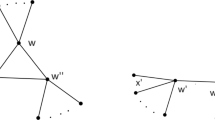Abstract
In this paper, we show that the number of monic integer polynomials of degree \(d \ge 1\) and height at most H which have no real roots is between \(c_1H^{d-1/2}\) and \(c_2 H^{d-1/2}\), where the constants \(c_2>c_1>0\) depend only on d. (Of course, this situation may only occur for d even.) Furthermore, for each integer s satisfying \(0 \le s < d/2\) we show that the number of monic integer polynomials of degree d and height at most H which have precisely 2s non-real roots is asymptotic to \(\lambda (d,s)H^{d}\) as \(H \rightarrow \infty \). The constants \(\lambda (d,s)\) are all positive and come from a recent paper of Bertók, Hajdu, and Pethő. They considered a similar question for general (not necessarily monic) integer polynomials and posed this as an open question.
Similar content being viewed by others
References
S. Akiyama, H. Brunotte, A. Pethő, and J. Thuswaldner, Generalized radix representations and dynamical systems. III, Osaka J. Math. 45 (2008), 347–374.
S. Akiyama and A. Pethő, On the distribution of polynomials with bounded roots, I. Polynomials with real coefficients, J. Math. Soc. Japan 66 (2014), 1–23.
S. Akiyama and A. Pethő, The distribution of polynomials with bounded roots, II. Polynomials with integer coefficients, Unif. Distrib. Theory 9 (2014), 5–19.
C. Bertók, L. Hajdu, and A. Pethő, On the distribution of polynomials with bounded height, J. Number Theory 179 (2017), 172–184.
R. Chela, Reducible polynomials, J. Lond. Math. Soc. 38 (1963), 183–188.
S. Chern and J. D. Vaaler, The distribution of values of Mahler’s measure, J. Reine Angew. Math. 540 (2001), 1–47.
K. Dörge, Abschätzung der Anzahl der reduziblen Polynome, Math. Ann. 160 (1965), 59–63.
A. Dubickas, On the number of reducible polynomials of bounded naive height, Manuscripta Math. 144 (2014), 439–456.
A. Dubickas, Counting integer reducible polynomials with bounded measure, Appl. Anal. Discrete Math. 10 (2016), 308–324.
A. Dubickas and M. Sha, Counting and testing dominant polynomials, Exper. Math. 24 (2015), 312–325.
A. Dubickas and M. Sha, Positive density of integer polynomials with some prescribed properties, J. Number Theory 159 (2016), 27–44.
P. Kirschenhofer and M. Weitzer, A number theoretic problem on the distribution of polynomials with bounded roots, Integers 15 (2015), A10.
G. Kuba, On the distribution of reducible polynomials, Math. Slovaca, 59 (2009), 349–356.
M. Madritsch and A. Pethő, A note on generalized radix representations and dynamical systems, Osaka J. Math. 50 (2013), 817–825.
G. Pólya and G. Szegö, Problems and Theorems in Analysis, Vol. II, Springer, Berlin-Heidelberg-New York, 1976.
W. Specht, Zur Zahlentheorie der Polynome. IV, Math. Z. 57 (1953), 291–335.
B. L. van der Waerden, Die Seltenheit der reduziblen Gleichungen und der Gleichungen mit Affekt, Monatsh. Mat. Phys. 43 (1936), 133–147.
M. Waldschmidt, Diophantine Approximation on Linear Algebraic Groups. Transcendence Properties of the Exponential function in Several Variables, Grundlehren der Mathematischen Wissenschaften, 326, Springer, Berlin, 2000.
Acknowledgements
This research was funded by a Grant (No. S-MIP-17-66/LSS-110000-1274) from the Research Council of Lithuania.
Author information
Authors and Affiliations
Corresponding author
Rights and permissions
About this article
Cite this article
Dubickas, A. On the number of monic integer polynomials with given signature. Arch. Math. 110, 333–342 (2018). https://doi.org/10.1007/s00013-017-1133-1
Received:
Published:
Issue Date:
DOI: https://doi.org/10.1007/s00013-017-1133-1



